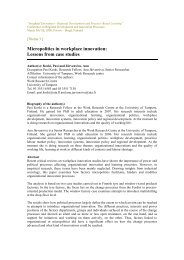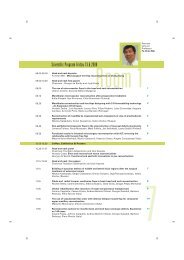Enhancing employees' innovation activity through motivational factors
Enhancing employees' innovation activity through motivational factors
Enhancing employees' innovation activity through motivational factors
You also want an ePaper? Increase the reach of your titles
YUMPU automatically turns print PDFs into web optimized ePapers that Google loves.
“Insightful Encounters - Regional Development and Practice–Based Learning”<br />
Conference on Regional Development and Innovation Processes<br />
March 5th-7th, 2008, Porvoo - Borgå, Finland<br />
basic <strong>motivational</strong> <strong>factors</strong> are an internal drive to satisfy an unsatisfied need and the will to<br />
achieve (Lindner 1998). Amabile (1998) divides motivation into intrinsic and extrinsic. Money is<br />
the most common extrinsic motivator, but it may make people feel bribed or controlled. If the<br />
work is routine and monotonous, employees work more just to get extrinsic rewards such as<br />
money. Using only an extrinsic motivator may even decrease worker’s innovativeness and<br />
problem-solving skills and the lack of motivation can reflect in the quality of work.<br />
As it was stated earlier there exists multiple ways to categorise motivating <strong>factors</strong>. Next are listed<br />
common areas that are studied in many research concerning motivation in managerial and<br />
employee levels in the organisation:<br />
- Job security<br />
- Sympathetic help with personal problems<br />
- Personal loyalty to employees<br />
- Interesting work<br />
- Good working conditions<br />
- Tactful discipline<br />
- Good wages<br />
- Promotions and growth in the organisation<br />
- Feeling of being in on things and<br />
- Full appreciation of work done.<br />
(Bettencourt 2004; Siitonen 1999; Lindner 1998)<br />
Feedback is a vital part of motivation. A common belief is that the superior gives the feedback<br />
and employees receive it. However, feedback can be multi-sourced: an employee receives<br />
feedback on his performance from peers, supervisors or customers. (London and Smither 1995)<br />
Peer feedback (or exposure to that) is important as it increases collaboration, communication,<br />
effective decision-making and self-management in a group (Dominick et al. 1997).<br />
Constructive feedback gives employees a feeling of belonging and builds mutual trust within the<br />
company. If evaluation is constantly just finding mistakes, if the ideas are not taken seriously by<br />
the management or the evaluation process is not open so that workers know how their ideas are<br />
being evaluated, a worker will no longer share his or her ideas (Amabile 1998; Schepers et al.<br />
1999). Also the timing matters. Delay in feedback or excessive criticism kills the motivation to<br />
think creatively (Amabile 1998). Giving feedback should not be employed as an intrinsic value<br />
but to adjust a situation in hand; after all, the reaction of an individual to feedback is a<br />
combination of several <strong>factors</strong> (de Bono and Colbert 2005).<br />
Leading the employees <strong>through</strong> changes<br />
In this study concept as management and leadership do not get much of attention in explanatory<br />
matter. As it is stated in the literature all managerial tasks need leadership skills fairly. In<br />
addition, individual differences play an important role of handling supervisory matters.<br />
Furthermore, the case company in this paper makes bit difficulties to identify leader and<br />
managerial positions, since interviewed employees are white-collar workers and work quite<br />
independently in daily basis. Moreover, the company is family owned and Managing Director as<br />
well as President is also participating daily works additionally of their other duties.<br />
Organisations in the turbulent business era are always confronting changes to some extent.<br />
Regardless of the type or the size of change is in question, it inevitably has an influence on<br />
people. Yet, there is no one universal principle to follow, as the circumstances are unique within








